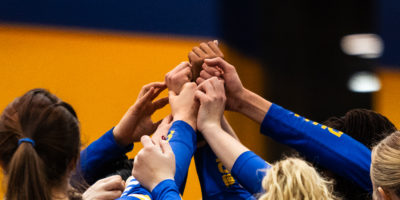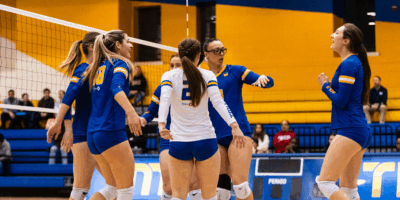By Luigi Rosella
Hot bods and big boobs usually translate into big bucks in the business of professional sports.
Whether it’s former Toronto Maple Leafs centre Doug Gilmour posing in spandex for a milk ad, or the bevy of beauties the World Wrestling Federation displays at each events, it’s evident sex sells sports.
On a university campus, however, marketing sports teams needs to be balanced with academic ethics and values.
For some time, Ryerson’s athletic department has received criticism for poor marketing of its sports teams.
Often the most visible advertisement of an athletic event, be it hockey or basketball, is a poster that usually gets pasted over by ads for essay writing services and rooms for rent.
Simon Curwen, a marketing professor at Ryerson, says the athletic department should be selling more than just athletic ability.
“You’re not just selling the game, you’re selling other things,” he said.
The 15-year Ryerson professor said team success is only a small ingredient in catching the attention of the average student sports fan. “People want everything,” he said. “They want success and good looks.”
The sex appeal approach has worked time and time again in sports, and with the recent success of several Rams sports teams, namely men’s basketball, a little face-and-body flaunting would be the ultimate compliment.
“If [the athletic department] tried marketing the personality and physical attractiveness of their players, they would be forming a relationship with the people,” Curwen said.
He suggests increased player exposure, like showcasing Ryerson athletes in front of the school, or in the cafeteria, would illustrate the physical attractiveness and personality of the players. He added being able to associate players with their sport would help bring students out to the games.
Several ethical questions are raised with marketing sex appeal, though.
Bob Fullerton, Ryerson’s director of athletics and recreation, is not about to get university sports mixed up with the business world.
“We’re not the WWF,” Fullerton said. “We’re in the education business. We are trying to teach values.”
Fullerton, 64, understands that sex appeal can be a catalyst for filling the seats in Kerr gym, but he is not willing to lower his or the university’s ethical standards to make that happen.
Besides, Fullerton does not blame small crowds at Ryerson sporting events on inadequate marketing.
“We do our best to put out first-class posters and pocket schedules to make people aware,” he said. “But when you have a downtown campus with an immense commuter population, it becomes more difficult to attract fans.”
Ryerson’s downtown location puts the Rams in direct competition with several other sports programs. For one, it’s dwarfed by programs at both the University of Toronto and York University.
Indirectly, Ryerson also has to contend with pro sports teams like the Maple Leafs and the Toronto Raptors.
The fact that most Ryerson students commute to school puts Rams games near the bottom of the student priority list.
Fullerton said if Ryerson was in a small town, fan support would increase.
“Queen’s University draws a lot of fans, but it’s a highly residential university,” he said. “When your life is at the university, it becomes more appealing to take part in university-related events.”
Approximately 65 per cent of Queen’s 13,400 students live on campus, while a petty seven per cent of 12,500 Ryerson pupils do the same here.
From a marketing perspective, that is a huge disadvantage, Fullerton says.
One person who agrees with him is John McFarlane, director of athletics and recreation at Queen’s University in Kingston.
“Ryerson definitely has different challenges,” McFarlane said. “The [Queen’s] Golden Gaels are fortunate to be in a small town where we’ve received an abundance of community support.”
McFarlane says the local paper, the Kingston Whig-Standard, as well as local TV and radio stations do “a great job” in promoting the school.
McFarlane, like Fullerton, still does not point to sex appeal as the answer.
“I do not see a place for sex appeal in an institute of learning,” McFarlane said. “In university sports, our job is to market the student athlete and the team.”
True, sex appeal is morally controversial. But according to Ryerson women’s basketball coach Sandra Pother, it can also tamper with team chemistry. “The last thing we want is for a player to separate herself from the team, and sex appeal may have that effect,” she said.
In addition to pre-game hype, Potheri wants more excitement at the game itself. When attending the University of Victoria, she said the half-time entertainment for the basketball team was fabulous. “There were different dance routines and music, and they would bring a fancy car out for all the fans,” Pothier said.
The athletics department is taking steps to improve Ryerson sports facilities for greater fan enjoyment.
A new $33,000 scoreboard has been installed along with new $75,000 portable seating that Ryerson’s assistant athletic director Chuck Mathies promises will be more comfortable.
Mathies has also employed a student to help market Ryerson sports to the students.
As for Curwen’s suggestion of greater player expose to the students, neither Fullerton nor McFarlane want to take away from the real reason these athletics are here: to be educated.
“They’re already giving up an enormous amount of time with games and practices,” Fullerton said.
“Asking them for more time may be asking too much.”











Leave a Reply